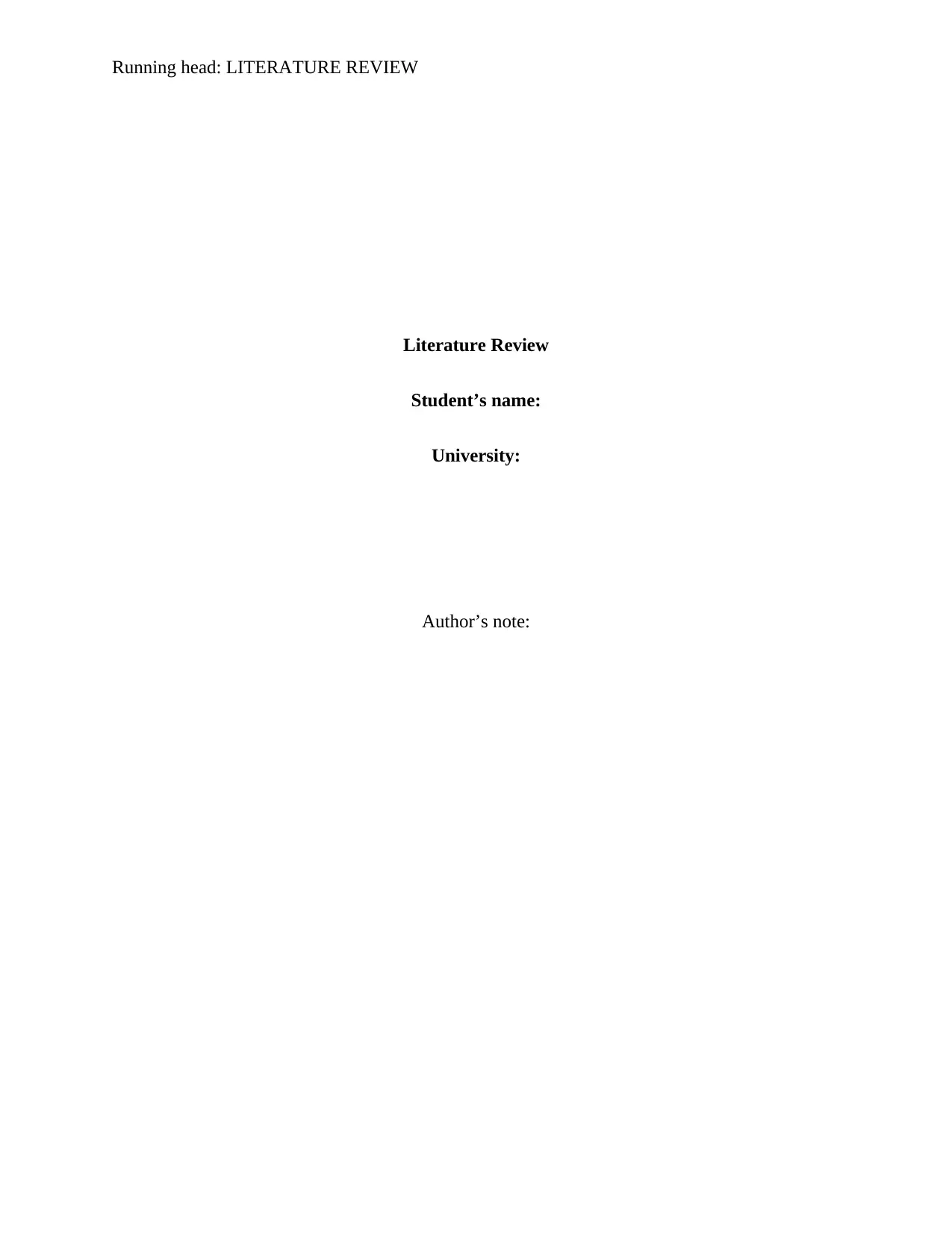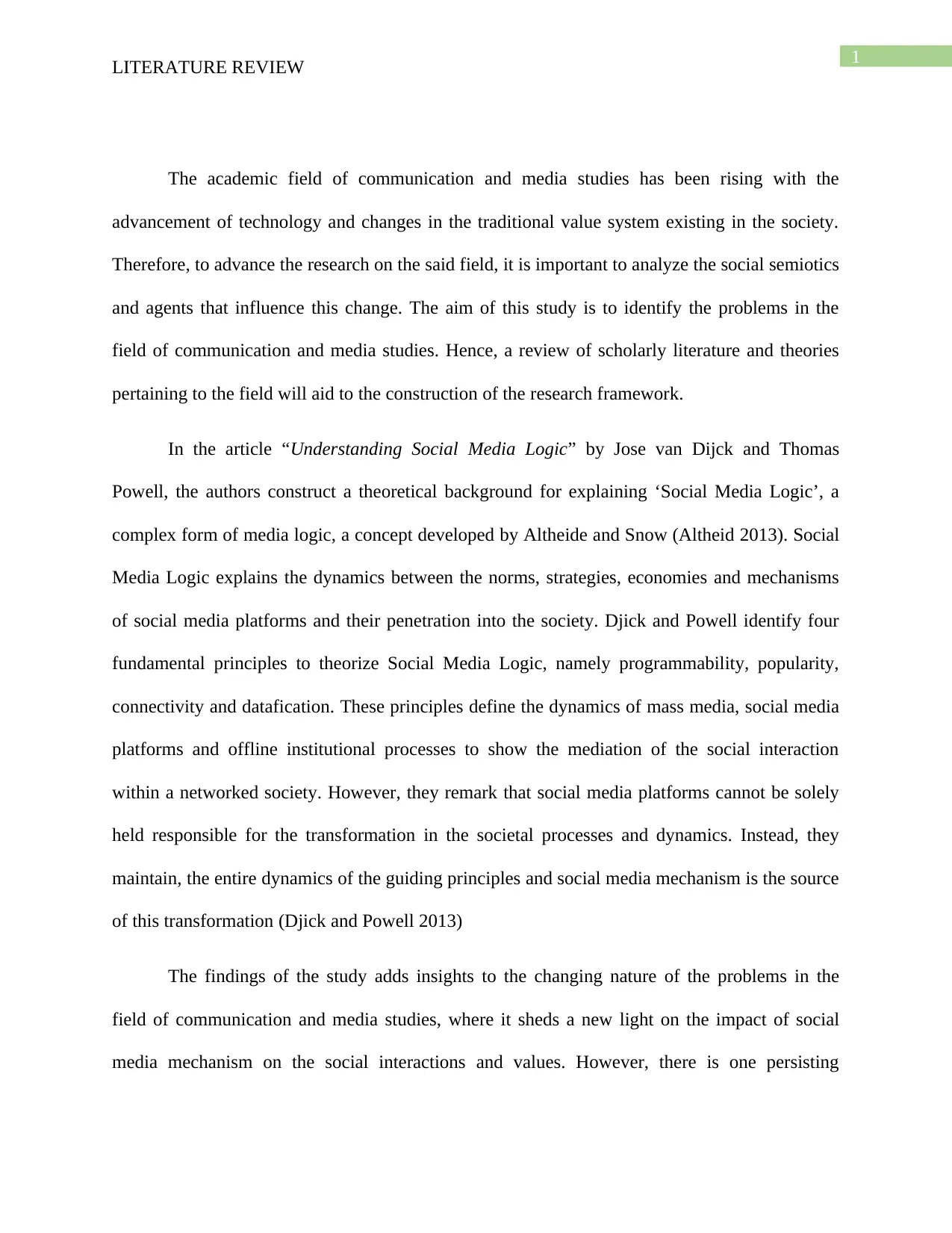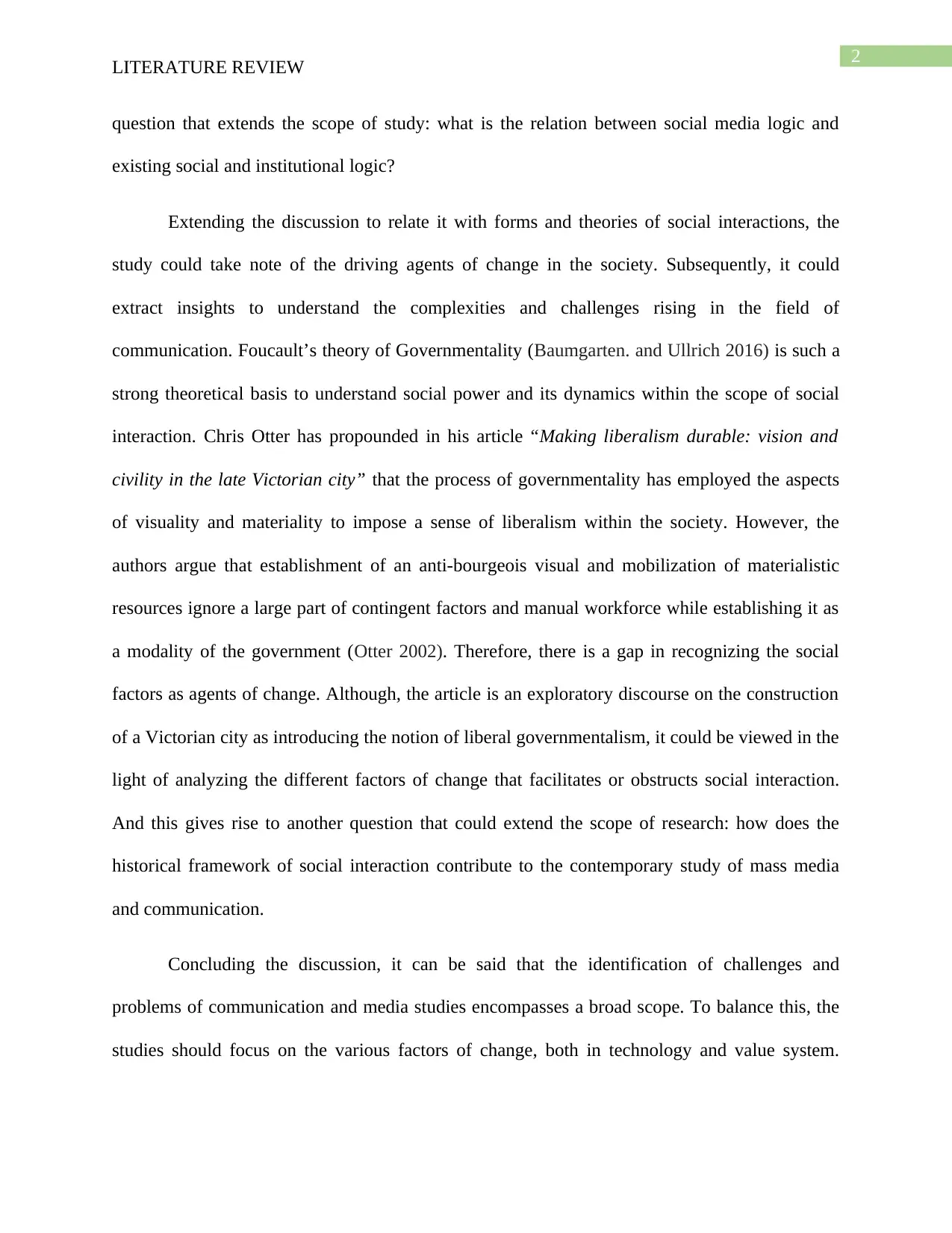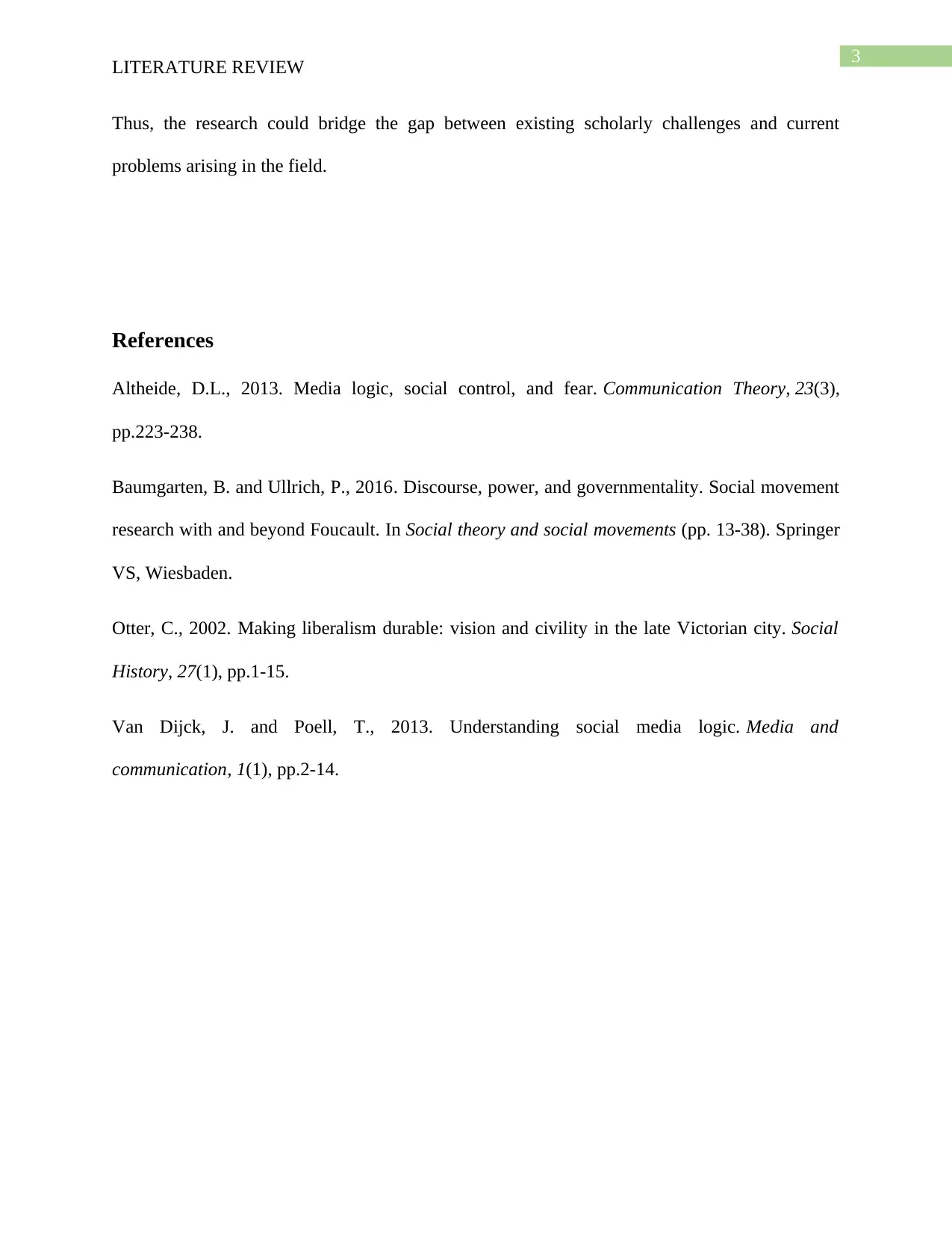Literature Review: Analyzing Communication and Media Studies Issues
VerifiedAdded on 2022/10/31
|4
|819
|500
Literature Review
AI Summary
This literature review examines the evolving field of communication and media studies, focusing on the impact of social media logic and governmentality. It analyzes the work of van Dijck and Poell, who define social media logic through principles like programmability and datafication, and Otter's exploration of governmentality in the context of Victorian cities. The review identifies challenges in understanding the relationship between social media logic and existing social structures, as well as the historical factors influencing contemporary media. The author highlights the need for research to address the interplay of technology and societal values, bridging gaps in current scholarly discussions and the issues emerging in the field.

Running head: LITERATURE REVIEW
Literature Review
Student’s name:
University:
Author’s note:
Literature Review
Student’s name:
University:
Author’s note:
Paraphrase This Document
Need a fresh take? Get an instant paraphrase of this document with our AI Paraphraser

1
LITERATURE REVIEW
The academic field of communication and media studies has been rising with the
advancement of technology and changes in the traditional value system existing in the society.
Therefore, to advance the research on the said field, it is important to analyze the social semiotics
and agents that influence this change. The aim of this study is to identify the problems in the
field of communication and media studies. Hence, a review of scholarly literature and theories
pertaining to the field will aid to the construction of the research framework.
In the article “Understanding Social Media Logic” by Jose van Dijck and Thomas
Powell, the authors construct a theoretical background for explaining ‘Social Media Logic’, a
complex form of media logic, a concept developed by Altheide and Snow (Altheid 2013). Social
Media Logic explains the dynamics between the norms, strategies, economies and mechanisms
of social media platforms and their penetration into the society. Djick and Powell identify four
fundamental principles to theorize Social Media Logic, namely programmability, popularity,
connectivity and datafication. These principles define the dynamics of mass media, social media
platforms and offline institutional processes to show the mediation of the social interaction
within a networked society. However, they remark that social media platforms cannot be solely
held responsible for the transformation in the societal processes and dynamics. Instead, they
maintain, the entire dynamics of the guiding principles and social media mechanism is the source
of this transformation (Djick and Powell 2013)
The findings of the study adds insights to the changing nature of the problems in the
field of communication and media studies, where it sheds a new light on the impact of social
media mechanism on the social interactions and values. However, there is one persisting
LITERATURE REVIEW
The academic field of communication and media studies has been rising with the
advancement of technology and changes in the traditional value system existing in the society.
Therefore, to advance the research on the said field, it is important to analyze the social semiotics
and agents that influence this change. The aim of this study is to identify the problems in the
field of communication and media studies. Hence, a review of scholarly literature and theories
pertaining to the field will aid to the construction of the research framework.
In the article “Understanding Social Media Logic” by Jose van Dijck and Thomas
Powell, the authors construct a theoretical background for explaining ‘Social Media Logic’, a
complex form of media logic, a concept developed by Altheide and Snow (Altheid 2013). Social
Media Logic explains the dynamics between the norms, strategies, economies and mechanisms
of social media platforms and their penetration into the society. Djick and Powell identify four
fundamental principles to theorize Social Media Logic, namely programmability, popularity,
connectivity and datafication. These principles define the dynamics of mass media, social media
platforms and offline institutional processes to show the mediation of the social interaction
within a networked society. However, they remark that social media platforms cannot be solely
held responsible for the transformation in the societal processes and dynamics. Instead, they
maintain, the entire dynamics of the guiding principles and social media mechanism is the source
of this transformation (Djick and Powell 2013)
The findings of the study adds insights to the changing nature of the problems in the
field of communication and media studies, where it sheds a new light on the impact of social
media mechanism on the social interactions and values. However, there is one persisting

2
LITERATURE REVIEW
question that extends the scope of study: what is the relation between social media logic and
existing social and institutional logic?
Extending the discussion to relate it with forms and theories of social interactions, the
study could take note of the driving agents of change in the society. Subsequently, it could
extract insights to understand the complexities and challenges rising in the field of
communication. Foucault’s theory of Governmentality (Baumgarten. and Ullrich 2016) is such a
strong theoretical basis to understand social power and its dynamics within the scope of social
interaction. Chris Otter has propounded in his article “Making liberalism durable: vision and
civility in the late Victorian city” that the process of governmentality has employed the aspects
of visuality and materiality to impose a sense of liberalism within the society. However, the
authors argue that establishment of an anti-bourgeois visual and mobilization of materialistic
resources ignore a large part of contingent factors and manual workforce while establishing it as
a modality of the government (Otter 2002). Therefore, there is a gap in recognizing the social
factors as agents of change. Although, the article is an exploratory discourse on the construction
of a Victorian city as introducing the notion of liberal governmentalism, it could be viewed in the
light of analyzing the different factors of change that facilitates or obstructs social interaction.
And this gives rise to another question that could extend the scope of research: how does the
historical framework of social interaction contribute to the contemporary study of mass media
and communication.
Concluding the discussion, it can be said that the identification of challenges and
problems of communication and media studies encompasses a broad scope. To balance this, the
studies should focus on the various factors of change, both in technology and value system.
LITERATURE REVIEW
question that extends the scope of study: what is the relation between social media logic and
existing social and institutional logic?
Extending the discussion to relate it with forms and theories of social interactions, the
study could take note of the driving agents of change in the society. Subsequently, it could
extract insights to understand the complexities and challenges rising in the field of
communication. Foucault’s theory of Governmentality (Baumgarten. and Ullrich 2016) is such a
strong theoretical basis to understand social power and its dynamics within the scope of social
interaction. Chris Otter has propounded in his article “Making liberalism durable: vision and
civility in the late Victorian city” that the process of governmentality has employed the aspects
of visuality and materiality to impose a sense of liberalism within the society. However, the
authors argue that establishment of an anti-bourgeois visual and mobilization of materialistic
resources ignore a large part of contingent factors and manual workforce while establishing it as
a modality of the government (Otter 2002). Therefore, there is a gap in recognizing the social
factors as agents of change. Although, the article is an exploratory discourse on the construction
of a Victorian city as introducing the notion of liberal governmentalism, it could be viewed in the
light of analyzing the different factors of change that facilitates or obstructs social interaction.
And this gives rise to another question that could extend the scope of research: how does the
historical framework of social interaction contribute to the contemporary study of mass media
and communication.
Concluding the discussion, it can be said that the identification of challenges and
problems of communication and media studies encompasses a broad scope. To balance this, the
studies should focus on the various factors of change, both in technology and value system.
⊘ This is a preview!⊘
Do you want full access?
Subscribe today to unlock all pages.

Trusted by 1+ million students worldwide

3
LITERATURE REVIEW
Thus, the research could bridge the gap between existing scholarly challenges and current
problems arising in the field.
References
Altheide, D.L., 2013. Media logic, social control, and fear. Communication Theory, 23(3),
pp.223-238.
Baumgarten, B. and Ullrich, P., 2016. Discourse, power, and governmentality. Social movement
research with and beyond Foucault. In Social theory and social movements (pp. 13-38). Springer
VS, Wiesbaden.
Otter, C., 2002. Making liberalism durable: vision and civility in the late Victorian city. Social
History, 27(1), pp.1-15.
Van Dijck, J. and Poell, T., 2013. Understanding social media logic. Media and
communication, 1(1), pp.2-14.
LITERATURE REVIEW
Thus, the research could bridge the gap between existing scholarly challenges and current
problems arising in the field.
References
Altheide, D.L., 2013. Media logic, social control, and fear. Communication Theory, 23(3),
pp.223-238.
Baumgarten, B. and Ullrich, P., 2016. Discourse, power, and governmentality. Social movement
research with and beyond Foucault. In Social theory and social movements (pp. 13-38). Springer
VS, Wiesbaden.
Otter, C., 2002. Making liberalism durable: vision and civility in the late Victorian city. Social
History, 27(1), pp.1-15.
Van Dijck, J. and Poell, T., 2013. Understanding social media logic. Media and
communication, 1(1), pp.2-14.
1 out of 4
Your All-in-One AI-Powered Toolkit for Academic Success.
+13062052269
info@desklib.com
Available 24*7 on WhatsApp / Email
![[object Object]](/_next/static/media/star-bottom.7253800d.svg)
Unlock your academic potential
Copyright © 2020–2026 A2Z Services. All Rights Reserved. Developed and managed by ZUCOL.